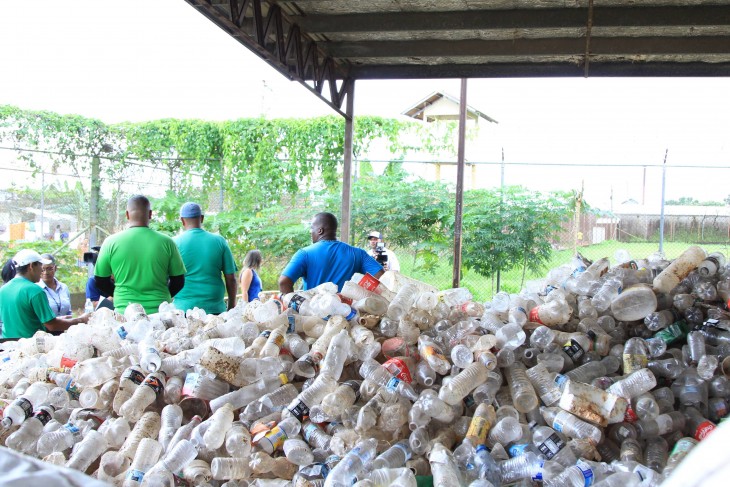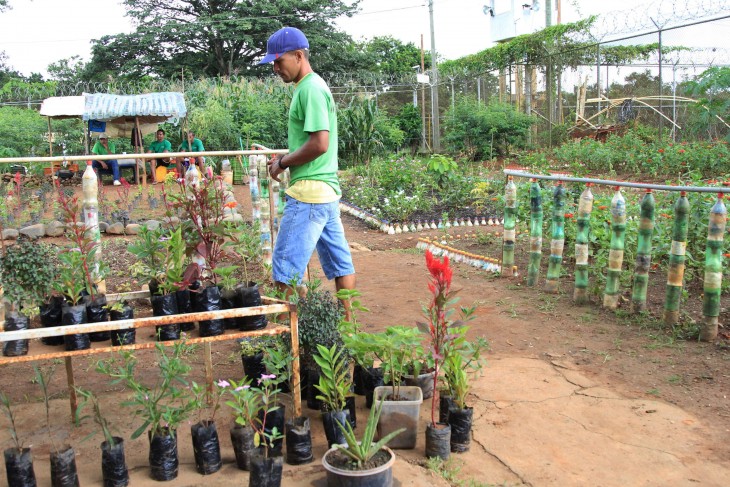Panama: Harnessing the potential of prison waste
Three years ago, the waste situation was out of control in La Joyita prison in Panama – a country where recycling, despite being all the rage elsewhere these days, is still not the norm. In prisons, this social and public health care problem is magnified by the conditions and restrictions of the environment. This is where EcoSólidos comes in: a programme where detainees turn the waste they generate into something useful.
Innovative inmates
La Joyita is part of the wider La Joya penitentiary complex. It houses 4,350 detainees: 40% of the total population of the complex and 25% of all detainees held in the country's 22 detention facilities.
"The cell blocks were strewn with rubbish, the courtyards were rubbish dumps, insects and rats rubbed shoulders with the inmates, who led their daily lives surrounded by filth. Today, the situation is quite different," says Lise Lehongre, who works on detainee welfare for the ICRC in Panama.
Fed up of the situation, the prisoners themselves came up with a solution, thanks to one inmate – a natural leader, agronomic engineer and recycling expert. EcoSólidos was born.
"We set ourselves the challenge of turning the problem into an opportunity," says Franklin Ayón, one of the three founding members of the initiative. "EcoSólidos was born in the prison cell blocks and our motto is the four Rs – yes, four – of recycling: reduce, reuse, recycle and – our addition – 'resocialize'. We've adopted a salamander as our logo, because salamanders regenerate, like us."
Nothing is wasted in La Joyita. All plastic, cans, food waste, paper and even sweet wrappers are recycled. Around 90% of the prison's waste is transformed and reused by the prisoners themselves.
Plastic and metal is sorted, crushed and stored to be sold. Plastic wrappings are stuffed into plastic bottles and used to make plastic bricks, ideal for construction. Each brick contains three square metres of non-recyclable plastic that won't end up polluting the environment – those are some considerable green credentials.
All the food waste is turned into high-quality organic fertilizer, which is then used in the prison's gardens as part of the Eco Flora and Sembrando Paz (Sowing Peace) programmes – spin-offs from EcoSólidos which now produce fruit, vegetables, ornamental plants and flowers, and trees for reforestation.
Trees that are native to Panama, like the guaiacum, teak and Panama tree, which private nurseries do not grow because they are not big moneymakers, are given pride of place in the prison. The Sowing Peace programme, which uses the fertilizer produced by EcoSólidos, has turned La Joyita into one of the top growers of these tree species in the country.

All the waste produced in the prison is transported to the EcoSólidos recycling plant, where it is sorted for processing – 90% is recycled. CC BY-NC-ND / CICR / A. Córdoba
Perks of recycling
Overcrowding, poor ventilation, damp and other factors make prisons an ideal breeding ground for disease, and waste only exacerbates that risk. A cleaner prison means fewer diseases and a better quality of life for the prisoners.
EcoSólidos also helps "resocialize" the prisoners by giving them opportunities to practise their professions as solderers, engineers and artisans, among others. Those who wish to learn a new trade also have opportunities to train in the recycling plant and nurseries. Working for the project is a kind of occupational therapy. What's more, there is a sentence reduction scheme for prisoners who work on the project.
"As well as advising the prison authorities in Panama on prison conditions, hygiene, maintenance and infrastructure, the ICRC advises them on ways to optimize the recycling plant and the benefits for its workers," says Giuseppe Renda, the ICRC head of mission in Panama. "We also provide supplies to keep the project running, like tools, gloves, boots, bags and other implements."
A promising success story
In three years, the EcoSólidos project has employed over 850 inmates. Some 90% of the prison's waste is recycled: 12 tonnes of aluminium and 15 tonnes of plastic have been recycled, and 10 tonnes of organic fertilizer have been produced.
The authorities and the ICRC plan to replicate this experience in other detention facilities, for the benefit of more detainees and society at large. Meanwhile, more individuals, organizations, partners and authorities are lining up to support the initiative.

Eco Flora and Sembrando Paz (Sowing Peace) are spin-offs from EcoSólidos, designed to complement the recycling project and involve more inmates, with different skills. CC BY-NC-ND / CICR / A. Córdoba
